
TRISTAN AUER, INTERIOR DESIGNER: "INTERESTING THINGS NEVER HAPPEN WHERE YOU EXPECT THEM TO"
Tristan Auer, known as the emotion architect, offers some insights on his artistic approach and methodology. |
 |
TRISTAN AUER, INTERIOR DESIGNER: "INTERESTING THINGS NEVER HAPPEN WHERE YOU EXPECT THEM TO"
Tristan Auer, known as the emotion architect, offers some insights on his artistic approach and methodology. |
Category: Worldwide - Suppliers -
Providers - Interviews
Interview made by Sonia Taourghi on 2024-03-28
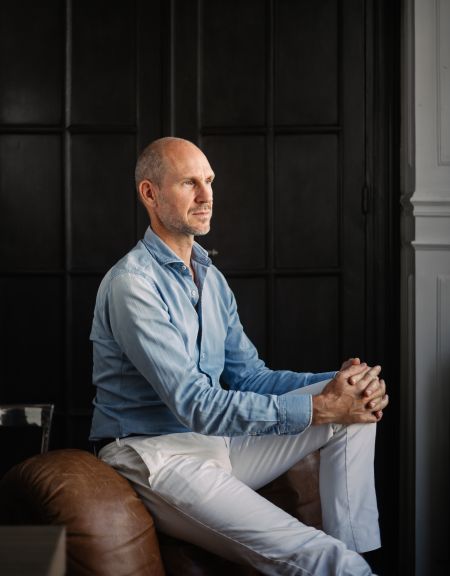 Tristan Auer, Interior and emotion architect
Photo credit © Amaury Laparra / Tristan Auer
During the exchange, the internationally renowned interior designer takes me on a philosophical and poetic journey. After graduating from ESAG-Penninghen, he joined the team of Christian Liaigre, and then Philippe Starck. In 2002, he set up his eponymous interior design firm, through which he also launched his furniture. Now a leading interior architect in the luxury sector, Tristan Auer is well aware of the commercial stakes involved in the many hotel projects, many of them iconic, that he has delivered or is working on today. But his approach is one of listening, harmony, and self-sacrifice that lets the place speak for itself. En route.Journal des palaces: How do you go from creation to the implementation of concrete ideas?Tristan Auer: Interior design is a science, a pictorial, Cartesian science. The spaces between people, the social interactions, that's a science too. Depending on the country, the tables may be too big, too small, or too far apart. It's the science of flows. It's what makes a place work or not, and it doesn't matter how it's decorated. There's no truth in decoration, it's a matter of taste and nobody's right. On the other hand, there are necessities; it needs to be more vibrant, warmer, and darker, then we can discuss, and try things out, and in the end, there will be one solution, not two.
I'm at the centre of it all, like an orchestra conductor, because I'm not on my own, there's lighting, there are uniforms, there's 'way finding', which is a very important notion because it has to be instinctive, and you can't ask yourself where to go. There are acoustics, music, OS&E, and so on. We don't give up until the end.How do you approach your projects? Are you given carte blanche or do you have precise specifications?I'm not given carte blanche because I'm not interested in my personality. We're talking about a place, a brand, a city, and sometimes the very personality of the hotel itself: for the Carlton, you can't ignore the personality of the Carlton. There's no room for the ego of a decorator behind all that. I'm here to make things to measure. I see myself as a tailor; someone comes to me to make a suit. A suit for himself; not for the set designer or anyone else, but a suit they'd have to wear. And because he has needs - he wants to go hunting, he's attending a very important meal, he wants to be able to live a modern life, as we have in Paris, and ride his bike at the same time... It's not the same suit. I use the customer's morphology and his build, but above all, I take into account what he wants to do with it. Use is very important, the virtue of necessity. That's what makes it beautiful. Because there's no such thing as beautiful or ugly, there's what works and what doesn't. And just like in the hotel business, there's no such thing as "good" or "bad". And since the hotel business has a commercial objective, it has to work, it has to make money. You can have the most beautiful hotel in the world, but if it's in the wrong place, if the staff are unable to serve customers properly, well, it's a failure. It's all this depth, this responsibility of my profession, that is decisive. I provide interior design, not decoration.How do you get to know and understand needs?I know everything about everything in a hotel. I know the intimacy of the hotel, I know the room staff, what they want, what worked before and what didn't, I interview the customers; I put myself like a little animal in the middle of it all and listen to what the walls have to tell me, what the people have to tell me...
In Japanese philosophy, action doesn't come first, before reflection. All you have to do is apply this teaching to yourself: look before you draw. I listen, I draw inspiration, and I'm open to what's going on.What's the most challenging thing about your approach as an interior designer?I don't suffer from situations, and nothing scares me, because I have a bit of experience. I know what I know, but I don't know where I'm going. So, calmly, with the help of the 45 members of my team, people who are enormously talented at every level, we think about each stage. And no stage is less interesting than another. As a project progresses, there's the design phase, of course, then the adjustments, the developments, the research - what do we change, what do we keep All the stages nourish me, and what might be complex for others is absolutely fascinating for me.What are the key differences between private and hotel projects?Identifying the client. When I work on a family home project, I know the family, and I'm responsible for the family's future life in the residence. But in all cases, I'm talking to someone, and in the case of a residence, I'm talking to the personality of the family. When I work on a hotel project, I have the impression that I'm honouring the personality of the hotel, of a building...
I'm incapable of doing anything for myself, for my ego. That's why if I were given carte blanche, it would be totally sterile and uninteresting. It's the prerogative of marketing to invent a story, whereas I feed off other people. It was only recently that I discovered that I'm an extrovert. As a shy, insecure person, I thought I was an introvert, but not at all: introverts feed on themselves, whereas extroverts feed on others. It was good for me to discover this because I can actually only feed off other people or elements that disturb my emotions. It could be a flower, an animal, a pavement in the street... In any case, on my own, I won't do much.Do you have many international projects?I mainly have projects abroad, and when they're in France, it's mainly for foreigners. It's quite astonishing, and inexplicable really, but from the outset I put service before aesthetics, and that's something that perhaps resonates more internationally than in France. On the other hand, it speaks to the modern hotel industry, of course.
We're all over the world, in the United States, China, a lot of it, the Middle East (Dubai, Saudi Arabia, Qatar), Turkey... So I really do work everywhere and for everything. With a few rare French projects, like here at the moment in Courchevel. As soon as you want to work at the very top end of the market, the investments are from abroad.When do you think there was a turning point in your career?Yes, there have been several. First, there was Les Bains Douches, in 2015. I'm always convinced that destiny is there, that things happen when they're meant to happen, and that there's no point in trying to force doors open. There was an alignment on this project: a lot of people wanted to do it, I arrived in completely crazy circumstances and then Jean-Pierre Marois entrusted the project to me. It wasn't an easy decision either, but it's a success today, and we've won a lot of awards for it. It was the first time I'd worked on something that wasn't me: at the time it was a nightclub, and I'd never been there. It was a nightclub at the time, and I'd never been there. I had to break everything down to reinvent everything, so I had to change everything to change nothing. Before that, I'd done another hotel in the Iles Moustiques, where I had to embody the life and creativity of the decorator, Olivier Messel, who designed it in the 70s. So there's an actor's side to the role that I really enjoy.
And then the Crillon... Then COVID. The pandemic boosted the sector. With all the hotels closing, investors had a good sense to invest. I live my life through hotels and I have an exceptional life, and I think I'm very lucky to be where I am today, thanks to my customers, and I never forget that. Thanks to the hotel business, of course, because that's where daydreams are made: people travel all over the world to live this experience, and so you can't spoil these moments, you have to make sure that everything is perfect, at every level. Even the doorbell that opens the door and says "Good morning Sir" has to be perfect.
I'm here to achieve excellence, ensure that everything goes perfectly. My designs, and the workflows I'm going to put in place, must help people to be better.What's special about luxury hotels?Customers expect a lot more. That's why in the luxury hotel sector, customers are increasingly turning to boutique hotels because they are much more creative. So much so that luxury hospitality is inspired by these free electrons, who are the private investors in boutique hotels. As I'm lucky enough to work for both, I can help one to benefit from the advances and dreams of the other. It's a cross-disciplinary approach. At the moment, I'm designing 16 hotels for 12 different brands. There are subjects and identities to preserve, depending on the part of the world or the clientele; and that's very important because you're not going to address the customer in the same way whether you're in the Middle East, Asia or the United States.
The complexity of my work is how to respond to individual demands while maintaining the brand identity, in other words, respect for the brand and its recognition.
That's the whole paradigm of the hotel business because there isn't one identified customer, there are identified customers. And that's where you have to manage to bring it all together. That's why I'm constantly questioning myself, why my life is full of doubts, why I don't have any magic formulas. Besides, those who do must be very bored with life.
I reinvent every time. I'm a haute decorator. Each project is different and has to be better than the last. And for me, that's ideal, because it's a world without limits.Is there a project that holds a special place?I never look back, I have a very bad memory and I instantly forget everything I've done. So I'll say the next ones. It's the projects I'm currently working on that are my babies. And I'm lucky in that, as I do a lot of them when I deliver a project I've just finished, it's not painful. It's an imbalance beforehand, and for that too I'm very lucky.What inspires you most and allows you to renew yourself?Everything inspires me, all the details, even the most insignificant. My childhood, with all the little details that go back from 0 to eight years, a book...
That's why I'm quite porous about it all. When the opportunity arises, I open a book, when I take the train, I always buy a magazine that I've never read before: it could be about knitting, the world of electric trains, or the tawny owl.... You always learn from these false leads, and I love that. Inspiration and interesting things never arrive where you expect them. You have to keep moving forward and try to multiply these opportunities.
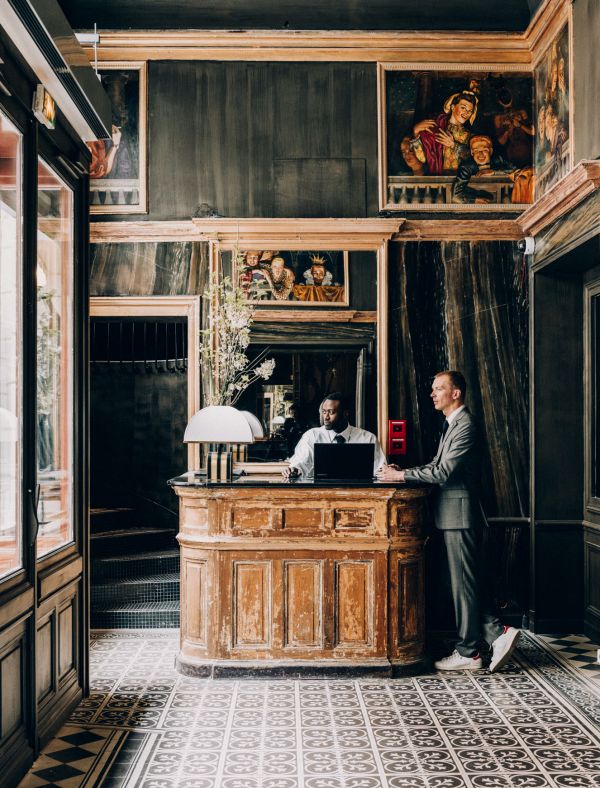 Reception at hotel Les Bains Paris - France
Photo credit © Jérôme Galland / Tristan Auer
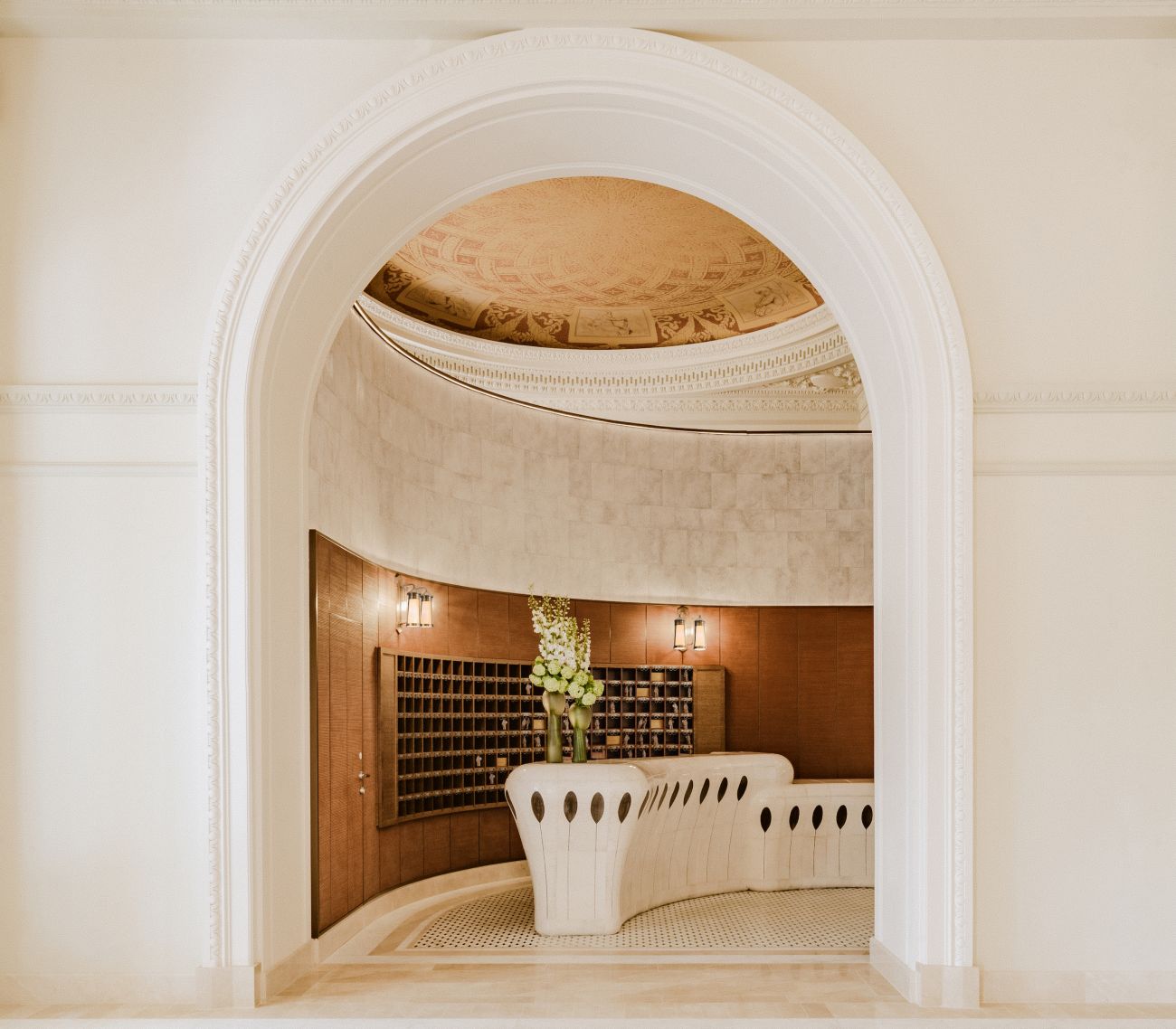 Reception at Carlton Hotel - Cannes, France
Photo credit © Amaury Laparra / Tristan Auer
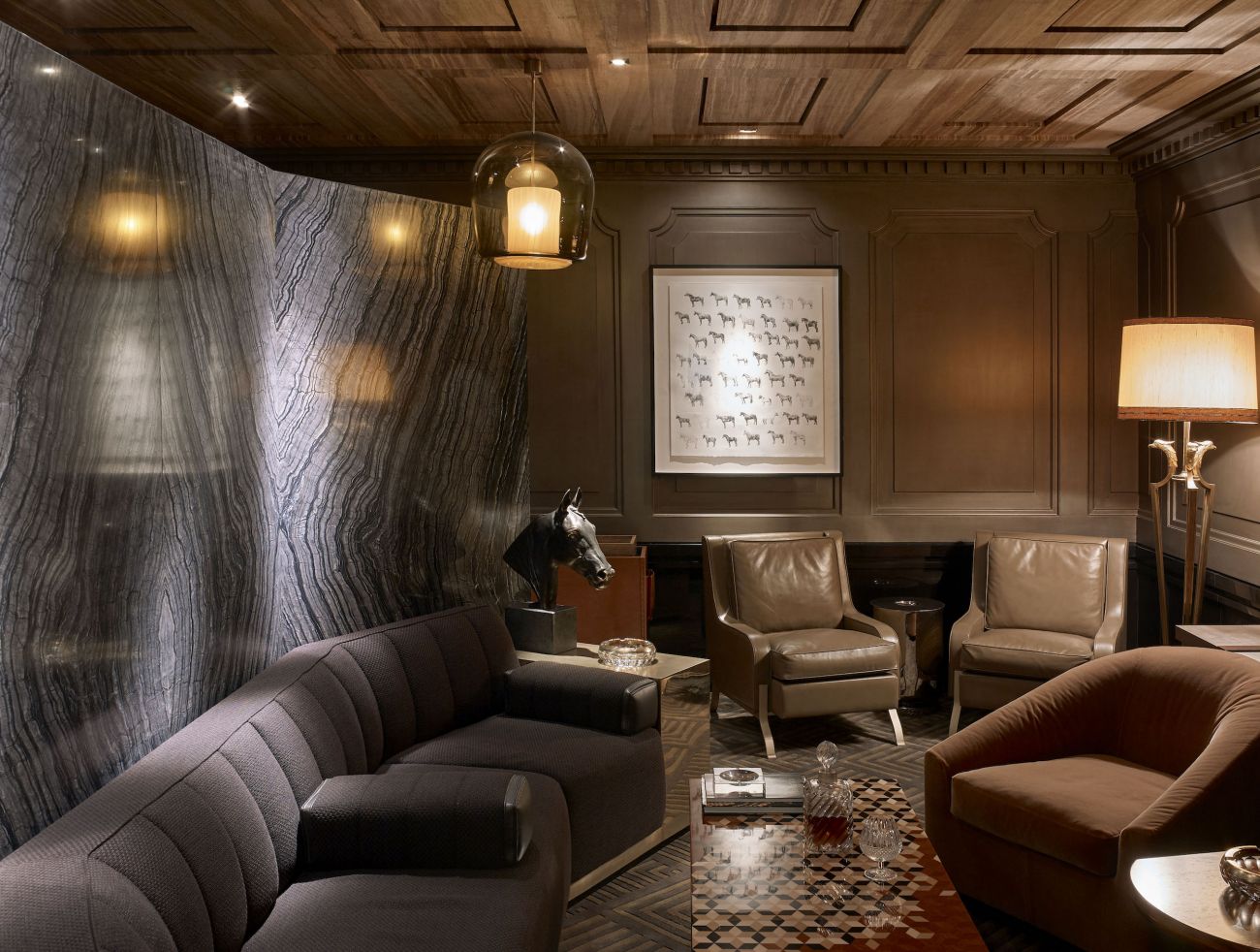 Lounge at HŰtel de Crillon - Paris, France
Photo credit © Philippe Garcia / Tristan Auer
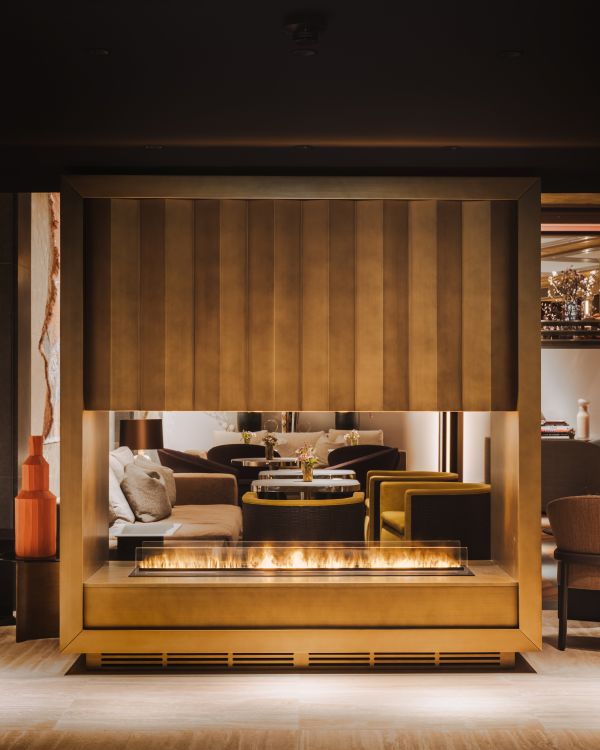 Lounge at Mandarin Oriental Zurich - Germany
Photo credit © Amaury Laparra / Tristan Auer
|
|





